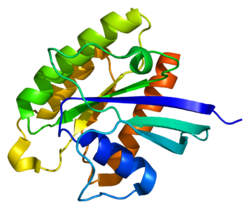
Turmeric powder and roots. Turmeric contains curcumin, which has been shown to have anti-inflammatory and antioxidant properties. Credit: © pinkomelet / Fotolia
Twice-daily supplements boosted cognitive power over 18 months. Daily consumption of a certain form of curcumin improved memory and mood in people with mild, age-related memory loss, according to the results of a study conducted by UCLA researchers. The research, published online Jan. 19 in the American Journal of Geriatric Psychiatry, examined the effects of an easily absorbed curcumin supplement on memory performance in people without dementia, as well as curcumin’s potential impact on the microscopic plaques and tangles in the brains of people with Alzheimer’s disease.
Found in turmeric, curcumin has previously been shown to ha...
Read More





 Images: 1. RHEB, Ras homolog enriched in brain 2. BACE1
Images: 1. RHEB, Ras homolog enriched in brain 2. BACE1


Recent Comments